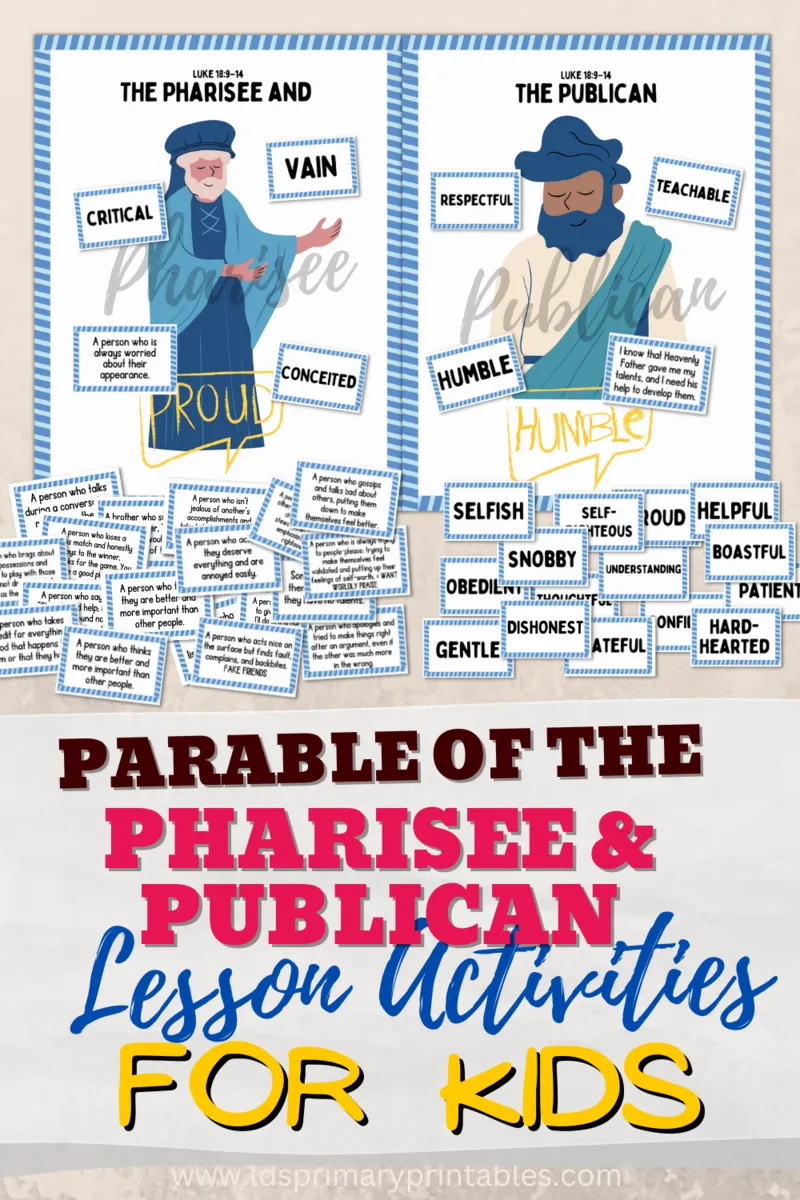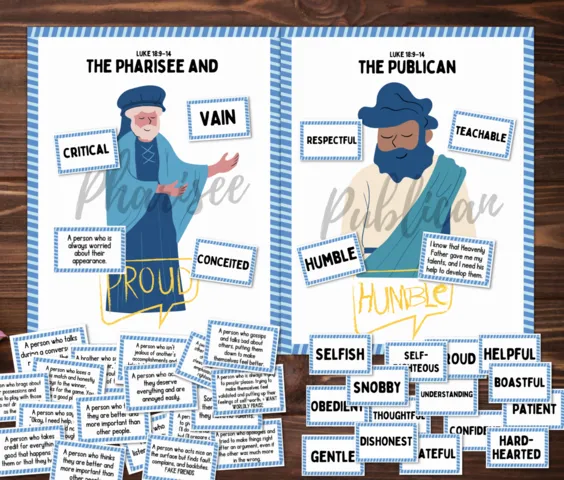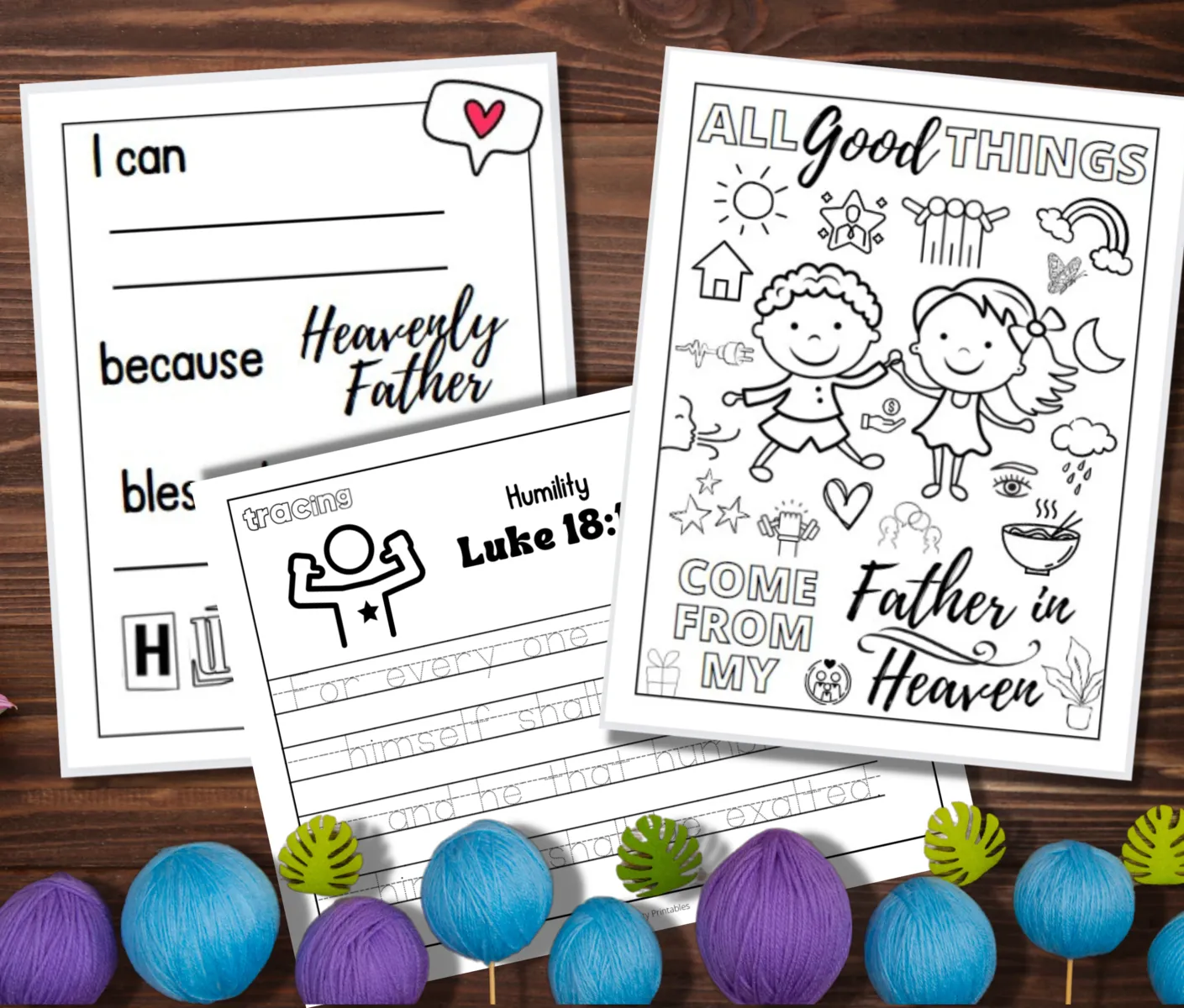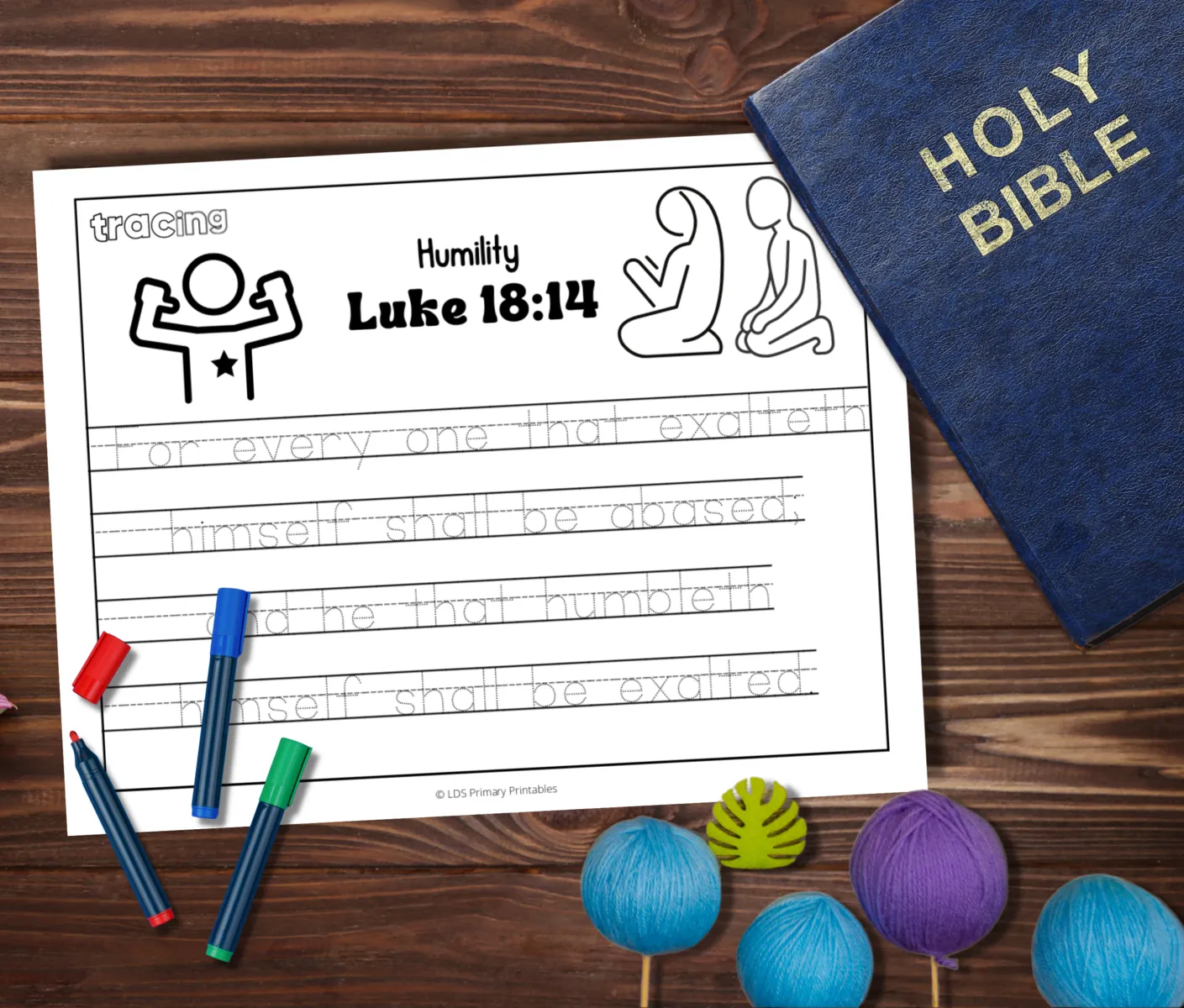Parable of the
PHARISEE & THE PUBLICAN (TAX COLLECTOR)
Luke 18:9–14
Parable Activities, Games, Lesson Ideas & Printables for Kids
Sweet Publishing / FreeBibleimages.org
parables, parables index, parable of the tax collector, parable of pharisee and publican, Luke 18, bible parables
Keyword Topics: parable, bible parables, parables definition, parable of the pharisee and publican, tax collector parable, parable of the pharisee and publican meaning, parables in the bible, bible stories the talents, parable examples, pharisee and publican bible story, the parable of the pharisee and tax collector story, parables LDS, parable of the pharisee and publican bible verses, rich fool story in the bible, Luke 12, luke parables, parables of jesus, bible printables for kids, parable printables for kids, parable activities, parable lessons for kids
Key Doctrines, Principles & Concepts
- God justifies (declares the righteousness of) those who humble themselves and seek His mercy.
- We should not seek for the praise of men but of God.
Activities Quick-Glance List
[Click each image below to jump to that section of the page.]
- Paharisee and Publican Play Mat Folder Game
- The Marshmallow Man object lesson video
- Activity Pages - Scripture Trace, Humility Write-In, "All Good Things Come from God" Coloring
Hello and welcome to LDS Primary Printables. I'm so excited you are here! LDS Primary Printables provides Come Follow Me, Gospel Topics, Primary Events, and Primary Singing Time Resources for Families, Primary Teachers and Primary Music Leaders.
--------------------------------------------
Join the mailing list for updates, specials & freebies.
The Pharisee & the Publican Play Mat Folder Game
Let kids read and place the word and situation cards on the correct side (proud vs. humble) and discuss.
Ex: Card- Vain (place on pharisee/proud side); A person who thinks they are better and more important than other people (place on the pharisee/proud side).
True humility is not to belittle or make light of our abilities. It is seeing ourselves as God sees us and recognizing that, as children of God, he has given us all that we have, and that each of us has been blessed with many talents.
ALL GOOD THINGS COME FROM GOD
This activity works well for younger children but can be done with any primary age and family as well.
Sing, "My Heavenly Father Loves Me" (verse 2).
Let kids make the craft then sing the song again.
(For primary teachers, make the craft ahead of time and use as you sing the song together in class).
Make a list of achievements and successes of the members of your family or kids in your class, including at least one for each person. For example, one child might have a musical talent or a gift for making friends. Perhaps someone has won a place on a sports team or written a beautiful poem. After you have finished this list, give a word of praise for each item on the list. You might mention how hard each person had to work for each achievement listed.
Ask each person to tell who is responsible for his achievement or ability. For example, a child might tell how he worked for the achievement he listed (for example, “It took a lot of time to learn how to play soccer well enough to make the team, and I had to miss out on a lot of other activities to practice”).
Then have him talk about other people who helped make his success possible (for example, “Dad taught me the rules of the game, and Mark practiced with me on Saturdays. Mom let my chores wait whenever I had a game”). Last, have him tell how Heavenly Father is ultimately responsible for this achievement (for example, “I can play soccer because Heavenly Father blessed me with a strong, healthy body. And our family has enough material blessings that I can afford to spend some time in such an enjoyable way”).
For younger kids, just have them repeat, "I can (their talent) because Heavenly Father blesses me."
Point out that being humble does not mean denying our achievements. But it does mean acknowledging the source of our blessings. Challenge your family or class students to develop a humble spirit by remembering that all good things in our lives come from Heavenly Father.
Pride & Humility
Pride Object Lesson Ideas
- Talk about how pride can puff us up, sort of like a balloon. Demonstrate this live! Explain that when a balloon gets too full of air, one of two things is likely to happen: Either you let go and it flies recklessly away (with a funny pfffft sound), or it….POPS!
- What’s inside counts…show students two mugs or cups, making sure they only see the outer part at first. One of them should be nice and clean on the outside, but have dirt or grime inside. The other mug should be older or a bit dirty on the outside, but clean within. Which would they rather drink out of? It might be surprising to see that the pretty and “clean” one was actually too nasty to drink out of safely. Explain that the topic today involves how our heart’s inner intent is more important than what the outer words or deeds proclaim. (This illustration works for multiple age groups).
- (Older students, or younger if simpler blocks are used) Use Jenga blocks to explain how bragging can lead to a fall. As you have students list things that someone might boast about, stack the blocks higher and higher, until the tower falls over. Describe how trusting our own power rather than setting foundations on the Lord can lead to collapse.
[Idea credit: ministry-to-children] - SEE REST OF LESSON HERE.
Humility is an attribute of godliness possessed by true Saints. It is easy to understand why a proud man fails. He is content to rely upon himself only. This is evident in those who seek social position or who push others aside to gain position in fields of business, government, education, sports, or other endeavors. Our genuine concern should be for the success of others. The proud man shuts himself off from God, and when he does he no longer lives in the light.
The Apostle Peter made this comment:
“Be clothed with humility: for God resisteth the proud, and giveth grace to the humble.
“Humble yourselves therefore under the mighty hand of God, that he may exalt you in due time.” (1 Pet. 5:5–6.)
Humble yourselves before the Lord, and he will exalt you. (James 4:10)
When we brag about how great we think we are, it places all of the attention on our own power, and neglects the importance of God’s work in our lives. We should in humility focus on Christ first and foremost, and remember that our strength comes from Him.
Role play different example situations where someone is humble while still knowing they did good vs when someone isn't or when parent is "proud" vain vs. "proud" humble. And talk about the differences in attitude and behavior.
Also see another good lesson on pride by Latter Day Kids HERE.
Additional Resources
Luke stated that the Savior addressed the parable of the Pharisee and the publican to people who “trusted in themselves that they were righteous, and despised others” (Luke 18:9). The parable probably surprised those who heard it, for Pharisees were generally admired and regarded as very obedient to the law, though Jesus had rebuked them for hypocrisy. Publicans, however, were tax collectors and were hated, shunned, and seen as corrupt. Though they were often grouped with harlots and sinners, many were receptive to Jesus’s teaching (see Matthew 21:31–32; Mark 2:15–16; Luke 15:1). The four Gospels record no instance of Jesus being critical of those who were willing to listen, to be taught, and to change their lives for good. To the self-righteous, proud, or hypocritical, however, He was often fearless and unyielding in His denunciation of their behavior, as He was in this parable. The Savior stated the moral of the parable in terms of pride and humility: “For every one that exalteth himself shall be abased; and he that humbleth himself shall be exalted” (Luke 18:14; see also D&C 52:15).
Howard W. Hunter, “The Pharisee and the Publican,” Ensign, May 1984, 64–66.
WAIT!...
WANT ACCESS TO 100+ CFM, GOSPEL TOPIC AND MORE PRINTABLES? Join the Printables Library!
WANT ACCESS TO HUNDRED+ OF DOLLARS WORTH OF PRIMARY SINGING TIME PRINTABLES?














